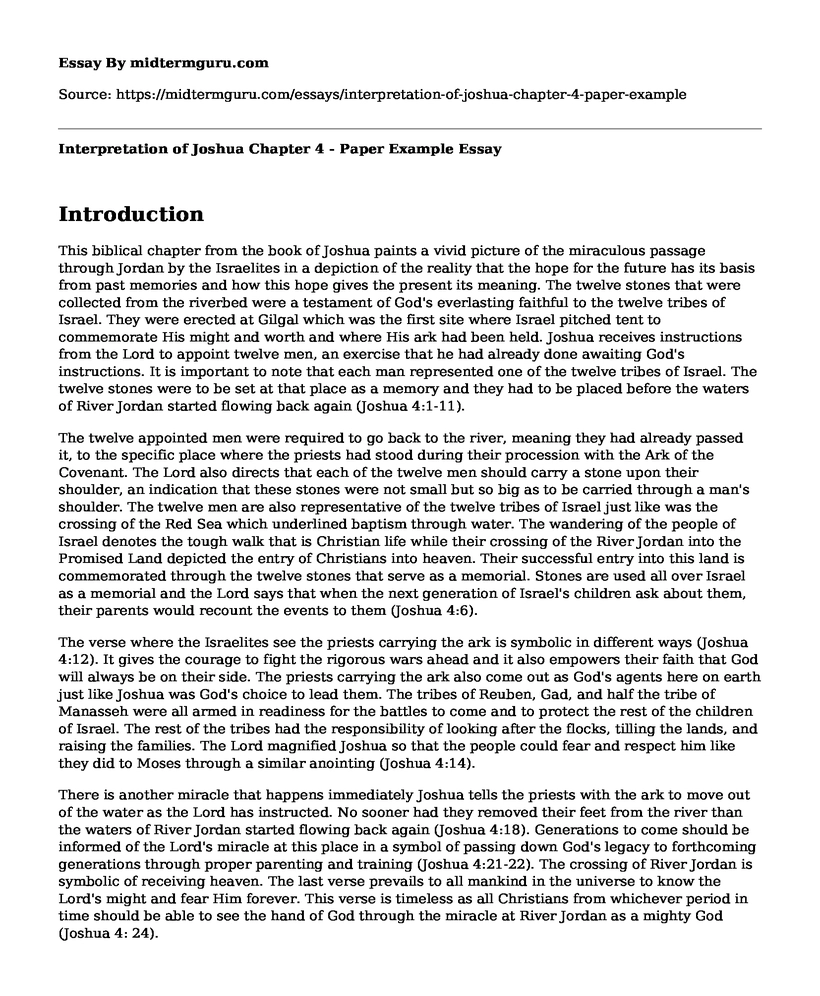Introduction
This biblical chapter from the book of Joshua paints a vivid picture of the miraculous passage through Jordan by the Israelites in a depiction of the reality that the hope for the future has its basis from past memories and how this hope gives the present its meaning. The twelve stones that were collected from the riverbed were a testament of God's everlasting faithful to the twelve tribes of Israel. They were erected at Gilgal which was the first site where Israel pitched tent to commemorate His might and worth and where His ark had been held. Joshua receives instructions from the Lord to appoint twelve men, an exercise that he had already done awaiting God's instructions. It is important to note that each man represented one of the twelve tribes of Israel. The twelve stones were to be set at that place as a memory and they had to be placed before the waters of River Jordan started flowing back again (Joshua 4:1-11).
The twelve appointed men were required to go back to the river, meaning they had already passed it, to the specific place where the priests had stood during their procession with the Ark of the Covenant. The Lord also directs that each of the twelve men should carry a stone upon their shoulder, an indication that these stones were not small but so big as to be carried through a man's shoulder. The twelve men are also representative of the twelve tribes of Israel just like was the crossing of the Red Sea which underlined baptism through water. The wandering of the people of Israel denotes the tough walk that is Christian life while their crossing of the River Jordan into the Promised Land depicted the entry of Christians into heaven. Their successful entry into this land is commemorated through the twelve stones that serve as a memorial. Stones are used all over Israel as a memorial and the Lord says that when the next generation of Israel's children ask about them, their parents would recount the events to them (Joshua 4:6).
The verse where the Israelites see the priests carrying the ark is symbolic in different ways (Joshua 4:12). It gives the courage to fight the rigorous wars ahead and it also empowers their faith that God will always be on their side. The priests carrying the ark also come out as God's agents here on earth just like Joshua was God's choice to lead them. The tribes of Reuben, Gad, and half the tribe of Manasseh were all armed in readiness for the battles to come and to protect the rest of the children of Israel. The rest of the tribes had the responsibility of looking after the flocks, tilling the lands, and raising the families. The Lord magnified Joshua so that the people could fear and respect him like they did to Moses through a similar anointing (Joshua 4:14).
There is another miracle that happens immediately Joshua tells the priests with the ark to move out of the water as the Lord has instructed. No sooner had they removed their feet from the river than the waters of River Jordan started flowing back again (Joshua 4:18). Generations to come should be informed of the Lord's miracle at this place in a symbol of passing down God's legacy to forthcoming generations through proper parenting and training (Joshua 4:21-22). The crossing of River Jordan is symbolic of receiving heaven. The last verse prevails to all mankind in the universe to know the Lord's might and fear Him forever. This verse is timeless as all Christians from whichever period in time should be able to see the hand of God through the miracle at River Jordan as a mighty God (Joshua 4: 24).
Cite this page
Interpretation of Joshua Chapter 4 - Paper Example. (2022, Oct 19). Retrieved from https://midtermguru.com/essays/interpretation-of-joshua-chapter-4-paper-example
If you are the original author of this essay and no longer wish to have it published on the midtermguru.com website, please click below to request its removal:
- Essay on Causes of Crusades
- A Series of Changes in Society Reflected by Islamic Empirical Dynasty
- Critical Response on Genesis: The Ark Before Noah - Paper Example
- The Kind of Life of Jesus Possible to Write - Essay Sample
- Ethical Beliefs on Climate Change as Observed by Christians and Muslims - Paper Example
- Interpretation of Joshua Chapter 4 - Paper Example
- God Exists: Kalam Cosmological Argument Explained - Essay Sample







